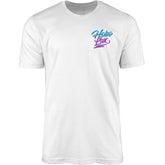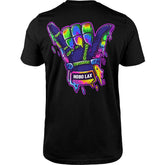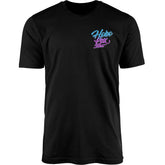Lacrosse Slang: Decoding the Lingo of the Lax Life
Lacrosse Slang: Decoding the Lingo of the Lax Life
Step onto any lacrosse field in America and you'll quickly realize players aren't just passing a ball – they're speaking their own language. Lacrosse slang creates an instant connection between players who live the lax lifestyle. Whether you're a seasoned midfielder looking to expand your vocabulary or a parent trying to understand what your kid means by "ripping cheddar," this guide will take you through the colorful world of lacrosse lingo that makes this sport's culture so unique.
Essential Lacrosse Slang Every Player Should Know
The lacrosse community has developed a rich vocabulary that goes beyond basic game terminology. These slang terms are the linguistic backbone of lacrosse culture. When you hear someone yell "I've got ball" during a game, they're claiming responsibility for defending the ball carrier. A player who calls for an "apple" is looking for an assist, while "cheddar" or "cheese" refers to the upper corners of the goal – the sweetest spot to score.
Equipment has its own unique nicknames too. Your helmet isn't just headgear – it's your "bucket" or "lid." Defensive players don't just carry longer sticks; they wield "d-poles." And that trusty lacrosse stick? Veterans might call it their "twig," "spoon," or "wand" depending on where they learned to play.
Players who dedicate themselves entirely to the sport earn the title of "lax rat" – a term of endearment for someone who eats, sleeps, and breathes lacrosse. Meanwhile, a "lax bro" embodies the stereotypical lacrosse player persona, complete with the distinctive style and attitude that comes with the territory.
Young players often develop their own colorful terminology for their equipment. In youth leagues across the country, you'll hear everything from "magic stick" to "goal getter" as young players develop their own relationship with the game's equipment and culture.
Regional Lacrosse Slang: How Lingo Varies Across America
Just like any slang, lacrosse terminology shows fascinating regional variations across America. What's called "top cheddar" in the Northeast might be known as "top shelf" in the Midwest. The traditional hotbeds of lacrosse in the Mid-Atlantic states have developed some of the oldest and most established slang terms, while emerging lacrosse regions are creating their own unique expressions.
In the Northeast, you might hear players talk about "ripping corners" when they score in the goal's upper angles. Head west, and you'll find California players calling a behind-the-back shot a "Cali" – claiming ownership of this flashy technique. Southern players have added their own flair to the lexicon with terms like "money" for perfectly placed shots.
Lacrosse terminology often reflects the geographic heritage of the game itself. The sport's Native American roots have influenced regional variations in terminology, with traditional hotbeds like upstate New York and Maryland developing distinctive dialects of lax speak.
Understanding these regional differences isn't just interesting – it's practical. If you're traveling for tournaments or changing teams, knowing the local lingo helps you integrate faster. The vocabulary you use instantly signals to others where you learned the game and becomes part of your lacrosse identity.
What is the Slang Term for a Lacrosse Stick?
The lacrosse stick – perhaps the sport's most essential piece of equipment – has collected more nicknames than any other gear item. While "stick" is the standard term, experienced players rarely use such plain language. Instead, you'll hear "twig" used widely across the country, referencing the stick's original wooden construction. "Spoon" emerged from the curved netting that cradles the ball, while "wand" suggests the magical control it gives skilled players over the ball.
Offensive players might lovingly refer to their shorter sticks as their "shorties," while defensive players proudly wield their "d-poles" or "long poles." Some players get even more creative, calling their specially strung sticks "the launcher," "the rocket," or even naming them like beloved pets.
The attachment players feel to their lacrosse sticks often shows in these nicknames. A well-broken-in stick becomes an extension of the player, earning special status in their lacrosse vocabulary. You might hear veterans talk about their "gamer" – the stick they trust for competition – versus their "practice twig" for everyday drills.
When players show off their favorite equipment, they're often sporting gear that reflects their personality and connection to the sport's culture.
Goalie Communication: The Secret Language of the Cage
Lacrosse goalies develop perhaps the most specialized vocabulary in the sport. As the defensive quarterbacks, goalies use precise communication calls to organize their defense and respond to offensive threats. This isn't just casual slang – it's a tactical language system that can make or break defensive stands.
Directional calls form the foundation of goalie communication. "X" indicates the area behind the goal, while "TOP CENTER" or "TOP LEFT/RIGHT" refers to specific zones in front of the goal. When a goalie shouts "FIRE," they're alerting defenders that a shot is coming and to be ready for rebounds.
Beyond locations, goalies use commands like "HOLD" (maintain position), "TURN" (force the attacker in a specific direction), and "PIPE" (protect the nearest goal post). During transitions, you'll hear "CLEAR" to start moving the ball upfield or "SHOT" to announce an incoming attempt on goal.
For slide coordination, goalies coordinate with phrases like "WHO'S HOT" (asking who's the first slide) or "WHO'S 2" (identifying the second slide). Effective goalies vary their voice pitch based on urgency and use players' names when possible to cut through the noise of competition.
Goalies also employ psychological tactics with their terminology. Terms like "locked in" signal to teammates that their goalkeeper is focused and ready, while calls like "my save" claim ownership of shots before they even arrive.
What are Some Famous Lacrosse Sayings?
Beyond practical gameplay terms, lacrosse culture has produced memorable sayings that capture the spirit and philosophy of the sport. "Respect the game" serves as a reminder of lacrosse's Native American origins and the importance of honoring its traditions. "Ground balls win games" emphasizes that hustle and fundamentals matter more than flashy skills.
When a player makes an exceptional shot, you might hear "he just put that in his top drawer" or "that was absolutely filthy" – high praise in lacrosse circles. Defensive players pride themselves on "putting the hammer down" when they deliver clean, effective checks.
Team huddles often conclude with motivational phrases like "rise and grind" or "dig deep" that have become ingrained in the sport's culture. After scoring, players might celebrate with a "celly" (celebration) and teammates will congratulate them with "nice finish" or "way to bury it."
Coaches have contributed their own wisdom to lacrosse lexicon. "Play fast, think slow" reminds players to combine athleticism with smart decision-making. "See ball, get ball" simplifies the often-chaotic ground ball battles to their essential purpose.
Here are some additional classic lacrosse sayings that have become part of the sport's rich tapestry:
- "Rocket propelled cheddar" – A hard shot to the upper corners
- "Mind the kitchen" – Protect the middle of the field/goal
- "GUTS" – Ground balls, Unselfishness, Toughness, Stick skills
- "Lax is life" – A declaration of dedication to the sport
- "On me, on me!" – Calling for a pass
- "Protect the house" – Defend the goal area at all costs
These sayings are often proudly displayed on team apparel and gear, becoming rallying cries and visual representations of the sport's culture.
Is 'Lax' Slang for Lacrosse?
Yes, "lax" is indeed the most common shorthand for lacrosse, used by players, coaches, and fans alike. This abbreviation has become so integrated into the sport's identity that it appears in team names, brand names (like Hobo Lax), hashtags, and everyday conversation. The term efficiently captures the essence of the sport in a single syllable.
Beyond just shortening the word, "lax" has spawned numerous compound terms that define the culture. "Lax life" describes the lifestyle surrounding the sport. "Lax rat" identifies someone obsessed with playing and improving. "Lax bro" characterizes a player who embodies certain stereotypical traits associated with the sport's culture.
The abbreviation has such strong association with the sport that it's rarely confused with the other meaning of "lax" (relaxed or lenient). In fact, the term helps create immediate recognition among community members. When someone talks about "hitting the wall for some lax," other players immediately understand they're practicing their stick skills against a wall.
Interestingly, "lax" has become so embedded in the culture that it transcends age groups. From youth players just starting out to professional athletes, the shorthand unites participants across all levels of the sport, creating an instant sense of community and belonging.
How to Sound Like a Lacrosse Veteran: Using Slang the Right Way
Using lacrosse slang correctly requires more than memorizing terms – it's about understanding the context and timing. Nothing marks someone as an outsider faster than misusing slang or forcing it into conversation unnaturally. The goal isn't to use every term you know but to incorporate language that fits your personal style and the situation.
Start by listening to experienced players during practices and games. Notice which terms are used consistently in your region and team. Begin with functional terminology – the calls and phrases that serve practical purposes during play. As you become comfortable, gradually incorporate more colorful expressions into your lacrosse conversations.
Remember that lacrosse slang evolves constantly. Terms popular five years ago might sound dated today. Stay current by following lacrosse content creators, professional players, and brands that stay connected to the pulse of the sport's culture. The language continues to develop as creative players coin new phrases that capture their experiences on the field.
Here's a quick starter glossary of essential terms to master:
Game Action Terms
- Rip – To shoot hard
- Dime – A perfect pass
- Ankle-breaker – A dodge that makes defenders lose balance
- Yard sale – When a check causes a player to drop equipment
- Gassing – Running hard, usually in transition
- Face dodge – Deceptive move bringing stick across face
Equipment Terms
- Flow – Hair coming out of helmet
- Lettuce – Another term for hair/flow
- Spoon – Lacrosse stick
- Bucket – Helmet
- Lid – Another term for helmet
- Kits – Uniform/gear combo
Position/Player Types
- FOGO – Face Off, Get Off (specialist)
- Pole – Defensive player with long stick
- Crease monkey – Attack who scores from close range
- Middies – Midfielders
- Rope unit – Defensive midfield group
Most importantly, let your passion for the game shine through. Authentic enthusiasm for lacrosse matters more than perfectly mimicking every slang term. True lax rats earn respect through their dedication, skill development, and love for the sport – the language follows naturally from immersion in the community.
Lacrosse Slang for the Next Generation
As the sport of lacrosse continues to grow beyond its traditional regions, new slang emerges with each generation of players. The digital age has accelerated this evolution, with social media platforms like TikTok and Instagram becoming breeding grounds for fresh lacrosse terminology.
Today's younger players are developing their own distinctive vocabulary. Terms like "sauce" (for a perfect pass), "going bozo" (playing with reckless abandon), and "zips" (rapid-fire shots) represent the newest evolution of lacrosse slang. These expressions often blend influences from gaming, social media, and other sports to create a unique linguistic fingerprint for Gen Z players.
Emerging lacrosse hotbeds are also contributing regional flavor to the sport's vocabulary. As the game expands in the South, Midwest, and West Coast, these areas are developing their own dialectical variations. Colorado players might refer to "mountain ball" when describing their aggressive style, while Texas teams talk about "bringing the heat" with hard checks.
Brands catering to the youth lacrosse community, like those offering youth lacrosse apparel, often incorporate this evolving slang into their designs and marketing, helping to codify and spread these new expressions throughout the lacrosse community.
Perhaps most importantly, the next generation of players is making lacrosse slang more inclusive. As girls' and women's lacrosse continues its rapid growth, female players are adding their own terminology to the sport's lexicon. Terms like "queen check" (a perfectly executed stick check in women's lacrosse) and "pocket rocket" (a fast, accurate shot) represent this expansion of the sport's linguistic traditions.
Lacrosse slang is much more than a collection of quirky terms – it's a living language that connects generations of players, coaches, and fans. From the traditional hotbeds of the Northeast to emerging lacrosse communities across the country, this distinctive vocabulary helps define what it means to be part of the lacrosse family. Understanding and using lacrosse slang appropriately signals that you're more than just a casual participant – you're invested in the culture and community surrounding the sport. Whether you're a veteran player with years of experience or a newcomer eager to fit in, mastering this language is a key part of the lacrosse journey.

















